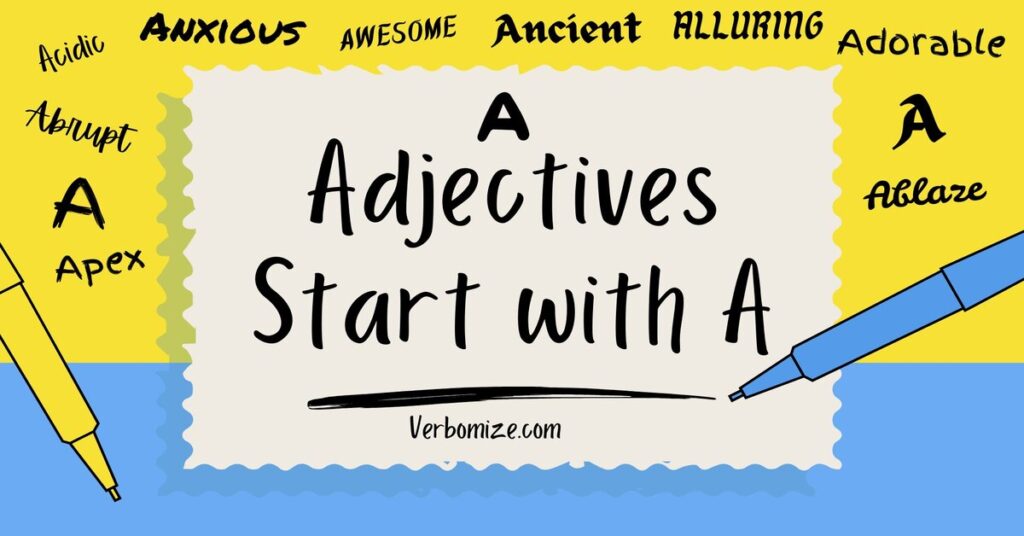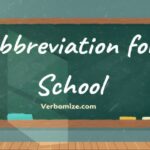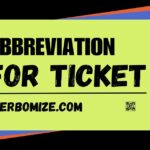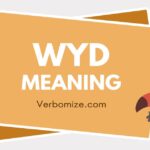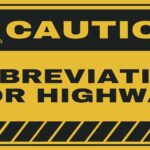Adjectives that start with A can transform your writing, adding vivid descriptions and color to your words. Whether you’re crafting an essay, story, or even a casual message, the right adjective can make all the difference. Imagine using “amazing” to describe a moment or “adventurous” to set the tone of your story—it instantly grabs attention.
In this article, you’ll discover a treasure trove of adjectives that start with the letter A will elevate your vocabulary and make your writing stand out. Ready to spice up your language and impress your readers? Keep reading to unlock a whole new world of powerful, expressive words!
positive adjectives start with a
“The world is full of positivity, and with these adjectives, you can reflect that in your conversations. When you need to describe something uplifting, inspiring, or excellent, these words will come in handy, especially when showcasing a personality that starts with A.”
- Adorable – Endearing or charming; pleasing to the eye.
- Admirable – Worthy of respect or admiration.
- Affectionate – Showing fondness or tenderness.
- Amazing – Extraordinary in a way that causes wonder.
- Astounding – Surprising in a way that’s difficult to believe.
- Awesome – Something impressive or awe-inspiring.
- Authentic – Genuine or real; not fake or counterfeit.
- Abundant – More than enough; plentiful.
- Angelic – Having qualities of an angel, such as purity or grace.
These adjectives can uplift a sentence and help you paint a picture that evokes a sense of positivity, admiration, and warmth.
Descriptive Adjectives: Adding Specificity and Detail
When you want to describe something with more precision and detail, these adjectives will help you do just that. They allow you to provide a more vivid or exact depiction of a person, place, or thing:
- Alluring – Attractive or tempting, often in a mysterious way.
- Aromatic – Having a strong, pleasant smell.
- Ancient – Extremely old or belonging to a distant past.
- Appetizing – Appealing or inviting to the appetite.
- Abrupt – Sudden and unexpected; curt.
- Alarming – Causing fear or anxiety.
- Ample – More than enough; abundant in quantity or size.
- Acidic – Having a sour taste or pH lower than neutral.
- Annoying – Causing irritation or displeasure.
These adjectives are perfect for adding texture and nuance to your writing, making your descriptions stand out with clarity and precision.
negative adjectives that start with a
Sometimes, it’s just as important to express dissatisfaction, worry, or caution. These adjectives will help you describe less-than-ideal situations, providing the right tone when discussing difficulties or discomfort:
- Arrogant – Overbearing in attitude or belief in one’s superiority.
- Awkward – Causing discomfort or embarrassment; clumsy.
- Annoyed – Feeling irritated or bothered.
- Aggressive – Ready to attack or confront, often in a hostile manner.
- Abhorrent – Causing strong feelings of disgust or repulsion.
- Austere – Severe or strict in manner or appearance; plain and simple.
- Antagonistic – Showing hostility or opposition.
- Adverse – Harmful or unfavorable in nature.
- Anxious – Nervous or worried, often about something uncertain.
These adjectives are crucial when you need to describe something negative or convey dissatisfaction effectively. They allow you to communicate discomfort or displeasure with ease.
Creative and Imaginative Adjectives: Sparking the Imagination
Whether you’re a writer crafting a story or a speaker trying to captivate your audience, creative adjectives can take your language to the next level. Here are some adjectives to help you infuse your words with imagination and flair:
- Avant-garde – Innovative or experimental, particularly in the arts.
- Alchemical – Mysterious and transformative in nature.
- Antiquated – Outdated or no longer in use, often in an interesting or historical way.
- Aesthetic – Pertaining to beauty or artistic expression.
- Amorphous – Lacking a clear shape or structure.
- Astronomical – Extremely large or vast in size or quantity.
- Artistic – Characterized by creative or aesthetic qualities.
- Autonomous – Self-governing; independent and self-reliant.
These adjectives help convey a sense of creativity, sparking the imagination of the reader or listener.
adjectives that start with a to describe a person positively
Here are some more adjectives to help you describe things or people in a positive, inspiring, and vibrant way:
- Admiring – Expressing approval or respect.
- Affable – Friendly and easy to approach or talk to.
- Abiding – Continuing for a long time; enduring.
- Astonishing – Very surprising or amazing, often in a positive way.
- Appreciative – Showing gratitude or thankfulness.
- Adventurous – Willing to take risks or seek new experiences.
- Amiable – Pleasant, good-natured, and easy to get along with.
- Auspicious – Suggesting a favorable outcome or good fortune.
- Aplomb – Self-confidence or assurance, especially in difficult situations.
These adjectives help bring a sense of optimism and admiration into your language, perfect for expressing appreciation or describing positive traits.
Powerful and Strong Adjectives: Conveying Strength and Impact
Sometimes, you want to emphasize strength, power, or dominance in your descriptions. These adjectives are ideal for conveying force or impact:
- Adept – Skilled or proficient at something.
- Astonishing – Extremely impressive or remarkable.
- Assertive – Strong-willed and confident in expressing one’s opinions.
- Arduous – Requiring great effort and endurance.
- Apex – The highest or most important point.
- Almighty – Having complete power; all-powerful.
- Able-bodied – Having a healthy body; physically capable.
- Anatomical – Pertaining to the structure of the body.
- Ablaze – On fire or brightly burning, symbolizing intensity.
These adjectives can add a sense of power or energy to your language, making your writing feel more impactful and dynamic.
Playful and Fun Adjectives: For Lighthearted Descriptions
If you’re looking to add some fun and whimsy to your writing, these adjectives will help you do just that. They bring an element of lightness and playfulness to your language:
- Antsy – Restless or impatient, often in a playful manner.
- Amused – Finding something funny or entertaining.
- Archetypal – Representing a typical example or ideal.
- Aflutter – In a state of excitement or agitation, often in a joyful way.
- Allegorical – Representing abstract ideas in a symbolic or imaginative way.
- Amusing – Providing enjoyment or entertainment.
- Aesthetic – Related to beauty or artistic expression.
- Agog – Very eager or excited, often in anticipation.
- Aloof – Distant or cool in manner, sometimes playfully so.
These adjectives can bring fun energy and playfulness to your language, ideal for lighthearted writing or conversations.
Intellectual and Thoughtful Adjectives: For Deep Reflections
For moments when you want to convey deep thinking or intellect, these adjectives will help you describe thoughtful, reflective, and insightful qualities:
- Analytical – Prone to examining or interpreting data in a logical, methodical manner.
- Abstract – Existing in thought or theory but not in a concrete form.
- Acerbic – Sharp or biting in tone, often used to describe criticism or wit.
- Astute – Having keen insight or sharp judgment.
- Auspicious – Marked by success or good fortune, often a sign of future success.
- Agnostic – Uncertain or skeptical, especially regarding knowledge of the unknown or the divine.
- Artful – Skillfully crafted, often with a sense of cunning or cleverness.
- Ambitious – Having a strong desire to achieve something, often greatness.
- Audible – Able to be heard, often used for sound or noise.
- Aristocratic – Referring to the highest social class or having the qualities of nobility.
These adjectives help you describe people, actions, or ideas that are marked by thoughtfulness, intelligence, or deep reflection.
Mysterious and Intriguing Adjectives: Spark Curiosity
If you want to captivate your audience’s attention and leave them intrigued, these adjectives are perfect for sparking curiosity or describing the unknown:
- Arcane – Known or understood by few; mysterious or secret.
- Aloof – Distant or reserved in manner, sometimes creating an air of mystery.
- Amorphous – Lacking a clear shape or structure, often used to describe something unclear or undefined.
- Anomalous – Deviating from the norm or expected course; unusual or irregular.
- Atypical – Not typical; unusual or out of the ordinary.
- Adrift – Floating without direction; aimless or uncertain.
- Ambiguous – Open to multiple interpretations or meanings; unclear.
- Aphantasic – Lacking the ability to visualize images in the mind, creating a sense of mental mystery.
- Asymmetrical – Lacking symmetry or balance, often used to describe something uneven or unexpected.
- Alchemical – Mysteriously transformative, often associated with magic or change.
These adjectives can help create an aura of intrigue and leave your audience wanting to know more.
Descriptive Adjectives: For Detailed and Vivid Imagery
These adjectives help you paint vivid pictures with your words, adding depth and detail to descriptions:
- Arid – Extremely dry; lacking moisture, often used to describe deserts or landscapes.
- Amber – A yellowish-orange color, often associated with warm, golden tones.
- Arduous – Requiring great effort or endurance, typically for difficult tasks.
- Angled – Having angles; not straight or uniform, often used to describe shapes or objects.
- Aesthetic – Relating to beauty or artistic taste, often used to describe visually pleasing things.
- Autumnal – Pertaining to autumn or fall, often used to describe colors or atmosphere.
- Abstruse – Difficult to understand; obscure.
- Aluminum – Light and silvery, commonly used to describe metal or objects made of this material.
- Aqueous – Relating to, or containing water; watery.
- Aerated – Filled with air, often used to describe liquids or environments that have been oxygenated.
These adjectives allow you to describe everything from colors and textures to environmental conditions with precision, making your writing more vivid and engaging.
Emotional Adjectives: Expressing Feelings and Reactions
When describing emotions or states of being, these adjectives will help you convey the mood or feelings accurately:
- Afflicted – Experiencing pain, suffering, or distress.
- Aghast – Filled with shock or horror; stunned.
- Agitated – Feeling anxious, disturbed, or excited.
- Alone – Without companions; solitary.
- Abashed – Feeling embarrassed, ashamed, or self-conscious.
- Alarmed – Feeling or showing fear or concern about something unexpected.
- Adoring – Expressing deep love and admiration.
- Apprehensive – Nervous or uneasy about something that may happen.
- Anguished – Feeling severe pain or distress, often mental or emotional.
These adjectives help capture the subtleties of human emotions, providing more nuanced expressions of feeling or reactions in different situations.
Physical and Sensory Adjectives: Describing the Body and Senses
These adjectives focus on describing physical attributes or sensory experiences:
- Astringent – Sharp or biting in taste, often used to describe foods or liquids.
- Acidic – Having a sour or sharp taste, typically used for fruits or substances with low pH.
- Archetypal – The classic or typical representation of something; standard model.
- Angular – Having sharp angles or a pointed shape; often used to describe people or objects with pronounced angles.
- Allergenic – Capable of causing an allergic reaction.
- Aural – Relating to hearing or the sense of sound.
- Antiseptic – Free from germs; sterile or clean.
- Aging – The process of becoming older, often used to describe things or people that show signs of time.
- Amputated – Describing a body part that has been surgically removed.
- Awash – Covered or flooded with a particular substance or quality (e.g., “awash with emotion”).
These adjectives help you describe sensory experiences or physical traits that invoke clear images and sensations for the reader.
Creative and Imaginative Adjectives: For Artistic and Innovative Expression
These adjectives bring imagination and creativity into your language, perfect for writers, artists, or anyone looking to express new ideas:
- Avant-garde – Innovative, experimental, and ahead of the times, often in art or culture.
- Anachronistic – Out of place in time, often referring to something that belongs to a different period.
- Allegorical – Symbolic or representative of abstract ideas, often in literature or art.
- Abstract – Not representing real objects; conceptual or theoretical.
- Anthropomorphic – Attributing human characteristics to animals or objects.
- Acrostic – A type of poem or puzzle where the first letter of each line spells out a word or message.
- Allusive – Containing indirect references or hints, often to deeper meanings or themes.
- Amorphous – Without a clear shape or structure, often used to describe something vague or undefined.
- Apocalyptic – Relating to the end of the world, often used in literature or film for disaster or dystopian themes.
- Archetypical – A very typical example of a certain thing or person, often used in myth or storytelling.
These adjectives allow you to describe things with a creative or artistic twist, perfect for anyone working with abstract concepts or unconventional ideas.
Intellectual and Analytical Adjectives: For Precise and Logical Description
When clarity and reason are key, these adjectives will help you articulate complex thoughts, analysis, or ideas:
- Analytical – Prone to examining and breaking down information logically.
- Acumen – The ability to make good judgments or decisions based on understanding.
- Abstract – Theoretical or not concrete; often used in philosophy and intellectual discourse.
- Autonomous – Independent and self-sufficient, not controlled by outside forces.
- Academic – Pertaining to education, scholarship, or formal study.
- Axiomatic – Self-evident or unquestionable; often used in logical or philosophical contexts.
- All-encompassing – Covering everything; comprehensive.
- Assertive – Expressing opinions or desires forcefully and with confidence.
- Artificial – Made or produced by human beings, often as an imitation of something natural.
These adjectives are valuable for expressing intellectual ideas, analyzing situations, or describing concepts in academic and logical discussions.
Descriptive of Space and Movement: Capturing Movement and Locations
For describing motion or spatial relationships, these adjectives are essential for creating an accurate picture of movement, position, or location:
- Aerial – Existing or occurring in the air, often used to describe views or movement in the sky.
- Architectural – Pertaining to the design or structure of buildings or other physical structures.
- Adjacent – Next to or adjoining something else.
- Accommodating – Willing to help or adjust to the needs of others.
- Anteroom – A small room leading to a larger room, often used for waiting.
- Angled – Having a specific angle; not aligned in a straight line.
- Agile – Moving quickly and with ease; nimble.
- Apt – Likely to do something; quick to respond or learn.
- Alcove – A small recess or nook in a room or space, often used for relaxation.
- Ambulatory – Able to move about or walk, often used in medical terms.
These adjectives are useful for describing spaces, locations, and the movement of people or objects within them.
Conclusion: The Power of Adjectives
Adjectives are more than just words – they are the colorful brushstrokes that bring a sentence to life. Whether you’re aiming to inspire, describe, or express complex emotions, using the right adjectives can make all the difference.
By integrating the adjectives we’ve covered here into your daily conversations or writing, you can add variety, depth, and precision to your language. So, next time you want to make your point clear or evoke an emotional response, reach for these words to enhance your communication.
Quiz: Expand Your Vocabulary with Adjectives Beginning with “A”
1. Which adjective refers to something that is extremely dry or lacks moisture?
- A) Aerated
- B) Amber
- C) Arid
- D) Amorphous
Answer: C) Arid
2. What does the adjective “Apathetic” describe?
- A) Having a strong desire for success
- B) Lacking interest or enthusiasm
- C) Being quick to react
- D) Showing kindness and compassion
Answer: B) Lacking interest or enthusiasm
3. Which adjective means “having sharp angles or a pointed shape”?
- A) Angular
- B) Alluring
- C) Apprehensive
- D) Abstract
Answer: A) Angular
4. What does the adjective “Altruistic” mean?
- A) Selflessly concerned for the well-being of others
- B) Self-centered and egotistical
- C) Able to adapt to new situations easily
- D) Having a strong desire for personal success
Answer: A) Selflessly concerned for the well-being of others
5. Which of the following adjectives describes a situation that is filled with air or oxygenated?
- A) Astringent
- B) Aerated
- C) Agitated
- D) Amputated
Answer: B) Aerated
6. Which adjective refers to something “relating to hearing or the sense of sound”?
- A) Agitated
- B) Aural
- C) Autonomic
- D) Atypical
Answer: B) Aural
7. “Apex” describes which of the following?
- A) A smooth curve
- B) The highest or most important point
- C) A type of metal
- D) An abstract idea
Answer: B) The highest or most important point
8. Which adjective is used to describe something that is “difficult to understand” or “obscure”?
- A) Astringent
- B) Agitated
- C) Abstruse
- D) Amorphous
Answer: C) Abstruse
9. What does the adjective “Autonomous” describe?
- A) Independent and self-sufficient
- B) Dependent on others
- C) Confused and disorganized
- D) Likely to change
Answer: A) Independent and self-sufficient
10. Which adjective means “showing shock, horror, or dismay”?
- A) Aghast
- B) Agog
- C) Apprehensive
- D) Amorphous
Answer: A) Aghast
11. Which of the following adjectives refers to “something that is symbolic or represents abstract ideas”?
- A) Altruistic
- B) Allegorical
- C) Astute
- D) Abstract
Answer: B) Allegorical
12. What does “Ambiguous” mean?
- A) Clearly defined
- B) Having multiple interpretations or meanings
- C) Extremely clear and straightforward
- D) Always correct
Answer: B) Having multiple interpretations or meanings
13. Which adjective is used to describe a “sharp or biting taste”?
- A) Astringent
- B) Abiding
- C) Aloof
- D) Aesthetic
Answer: A) Astringent
14. What does the adjective “Aesthetic” describe?
- A) Relating to beauty or artistic taste
- B) Having no form or structure
- C) Lacking a clear purpose or direction
- D) Difficult to understand
Answer: A) Relating to beauty or artistic taste
15. Which adjective describes someone who is “willing to take risks or try new experiences”?
- A) Audacious
- B) Aghast
- C) Anguished
- D) Afflicted
Answer: A) Audacious

Jone Smith is an experienced blogger and content creator behind Verbo Mize. With a passion for storytelling and insightful commentary, Jone brings a wealth of knowledge on diverse topics. His expertise in blogging, combined with a keen eye for detail, makes his work both informative and engaging, offering readers valuable perspectives on a wide range of subjects.

